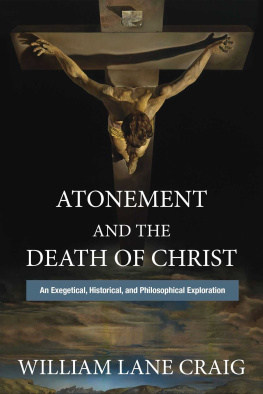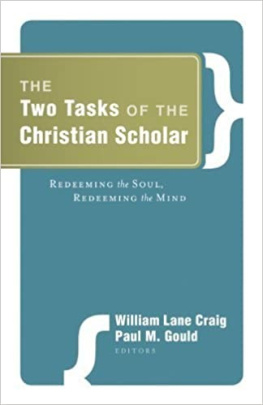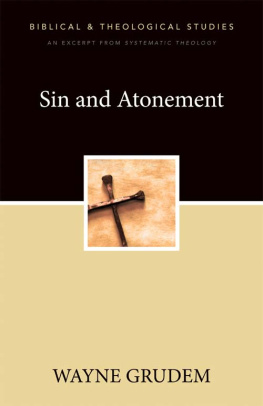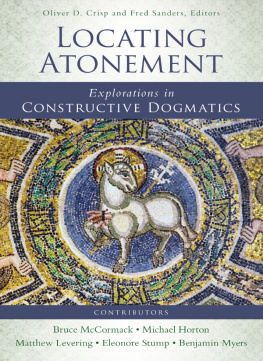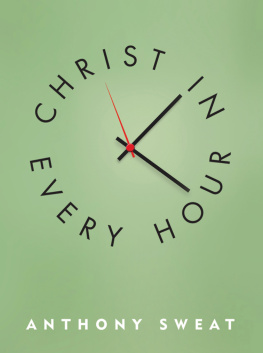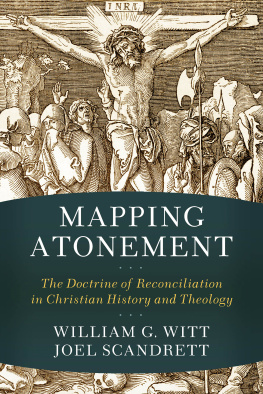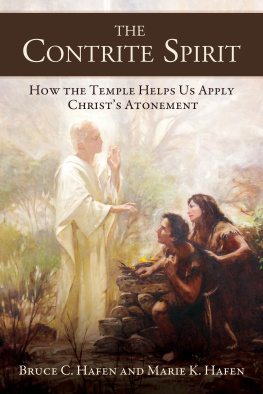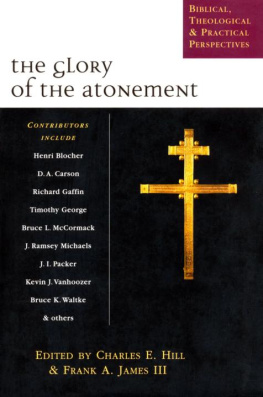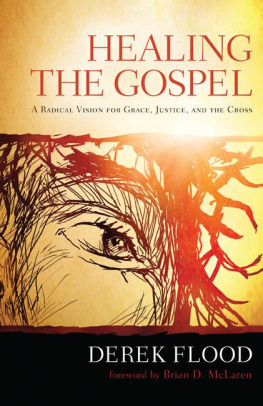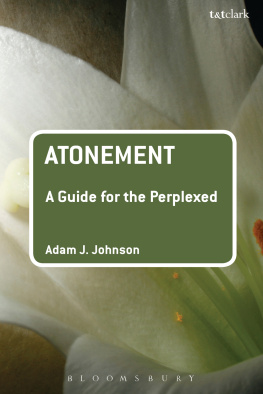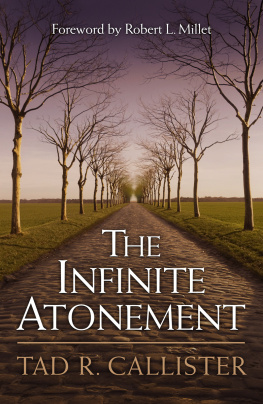This is a very unusual and important book. In this volume, William Lane Craig brings together a superb combination of the three essential dimensions of the Doctrine of the Atonement: the biblical, the theological, and the philosophical. Most significantly, he starts with the foundation in biblical exegesis and theology, both Old and New Testament, and uses it as an anchor for his handling of the systematic theological and analytical philosophical discussions that follow. In this way, he is able to set the whole discussion in perspective, recognize the central importance as well as the theological and philosophical coherence of penal substitution, and show how some of the other views of the Atonement also have something to contribute. This is a magnificent accomplishment, for which we should all be truly grateful. With enthusiasm, I heartily recommend it to all who pursue the serious study of this all-important biblical doctrine.
R ICHARD E . A VERBECK , Professor of Old Testament and Semitic Languages, Trinity Evangelical Divinity School
Atonement and the Death of Christ is the definitive work on penal substitution. Those who want to argue against penal substitution must first get familiar with this volume. It is a welcome addition to the now growing philosophical literature on the atonement.
T YLER M C N ABB , Post-doctoral Fellow, University of Macau
In Atonement and the Death of Christ William Lane Craig defends a classical Reformed understanding of the atonement. However, unlike other works on this subject, this book addresses issues in patristics, Anglo-American law, and philosophy, making the case that insights from these areas of study may illuminate our understanding of the atonement. Craig shows us that the doctrine of the atonementthough an essential belief of Christian theologyis no different than fundamental beliefs within other disciplines insofar as it may be analyzed with intellectual tools outside the domains from which it originally arose. Craig should be commended for reminding us that the proper development of Christian theology is enhanced when it is in conversation with other academic fields.
F RANCIS J . B ECKWITH , Professor of Philosophy & Church State Studies, Baylor University
ATONEMENT AND THE DEATH OF CHRIST
An Exegetical, Historical, and Philosophical Exploration
William Lane Craig
BAYLOR UNIVERSITY PRESS
2020 by Baylor University Press
Waco, Texas 76798
All Rights Reserved . No part of this publication may be reproduced, stored in a retrieval system, or transmitted, in any form or by any means, electronic, mechanical, photocopying, recording, or otherwise, without the prior permission in writing of Baylor University Press.
Cover Design : Kasey McBeath
Cover image : detail from Dal, Salvador (1904-89) / Spanish, Christ of St. John of the Cross , 1951 (oil on canvas), CSG CIC Glasgow Museums Collection / Bridgeman Images
Hardcover ISBN: 978-1-4813-1204-2
PDF ISBN: 978-1-4813-1208-0
Kindle ISBN: 978-1-4813-1207-3
ePub ISBN: 978-1-4813-1206-6
Library of Congress Control Number: 2020008694
C ONTENTS
I
Biblical Data Concerning the Atonement
II
Dogmatic History of the Doctrine of the Atonement
III
Philosophical Reflections on the Doctrine of the Atonement
O ne of the most noteworthy developments in contemporary philosophy of religion has been the ingress of Anglo-American Christian philosophers into areas normally considered the province of systematic theologians. In particular, many Christian philosophers have taken up the task of helping to formulate and defend coherent statements of Christian doctrine. So Christian philosophers have been actively engaged, for example, in discussion of the doctrines of the Trinity, incarnation, and atonement, which might be called the big three of peculiarly Christian doctrines. The work of Christian philosophers in systematic theology has even served to spawn a new subdiscipline of theology: analytic theology, which is committed to using the tools of analytic philosophy in exploring Christian doctrine.
The activity of Anglo-American Christian philosophers in the field of systematic theology has even come to the attention of German theologians. In the standard German reference work in theology, the Theologische Realenzyklopdie ( TRE ), Christoph Gestrich draws attention to the contribution of Anglo-American analytic philosophy to the subject of the incarnation and its possible relevance for the subject of the atonement:
In Great Britain there was already during the 19th century a widespread and growing atonement-literature spanning theological lines and confessions and a nearly general consensus concerning Christs substitutionary atonement. It was extensively debated, for example, whether one should speak of the objective validity of this atonement or the necessity of a subjective realization in faith and morals. By the 20th century this topic had for the most part been exhausted in the English-speaking realmuntil during the 70s a lively discussion about the historicity of the incarnation of the Son of God, stimulated by analytic philosophy, was kindled. Is the atoning descent of the heavenly Son of God to earthly flesh only a metaphorand thus by no means a part of objective history? Chiefly related to this question there was once more in the 80s and 90s of the 20th century a whole series of English-language theological investigations concerning the problem of the atonement . The predominant result: the admittedly metaphorical talk of the incarnation of the Son of God in the Christian confession remains now as always indispensable and refers to an actual event. Nevertheless, one must consider anew in what way it leads to the divine atonement .
The present book is intended to be a contribution to this ongoing debate, exploring the relation between atonement and the death of Christ. I shall explore this question exegetically, historically, and finally philosophically. My aim is articulate the core of an atonement theory which is both biblical and philosophically coherent.
I am especially indebted to Dr. Daniel P. Bailey for extensive conversation and correspondence as well as literature concerning the meaning of Pauls term hilastrion in Romans 3:25. I am also grateful to Dr. E. Descheemaeker of the Edinburgh Law School for stimulating correspondence concerning the relevance of the philosophy of law to the subject of the atonement and for guidance into the legal literature. I am grateful, too, to Shaun McNaughton at Brown & Streza, LLP, for help in obtaining court opinions. I am also thankful to my research assistant Timothy Bayless for procuring for me research materials, as well as proofreading and preparing the bibliography and indices. As always, I am thankful for my wife Jans faithful support and interest in this subject.
My short book The Atonement (Cambridge University Press, 2018) in the Cambridge Elements of Philosophy series is an extract of this book and serves as a sort of prcis of it. Material from this book has also been published in various journals: Is Penal Substitution Incoherent? An Examination of Mark Murphys Criticisms, Religious Studies 54, no. 4 (2018): 50926; Is Penal Substitution Unjust? International Journal for Philosophy of Religion 83 (2018): 23144; Is Penal Substitution Unsatisfactory? Philosophia Christi 21, no. 1 (2019): 15568; and Divine Forgiveness and Legal Pardon, in The Philosophy of Forgiveness , vol. 4, Christian Perspectives on Forgiveness , ed. G. L. Bock (Wilmington, Del.: Vernon Press, 2018), 122.
William Lane Craig
Atlanta, Georgia
, which singles out for discussion the doctrines of the Trinity, incarnation, and atonement. It is surprising that this article includes no discussion of penal substitutionary theories apart from satisfaction theories.

